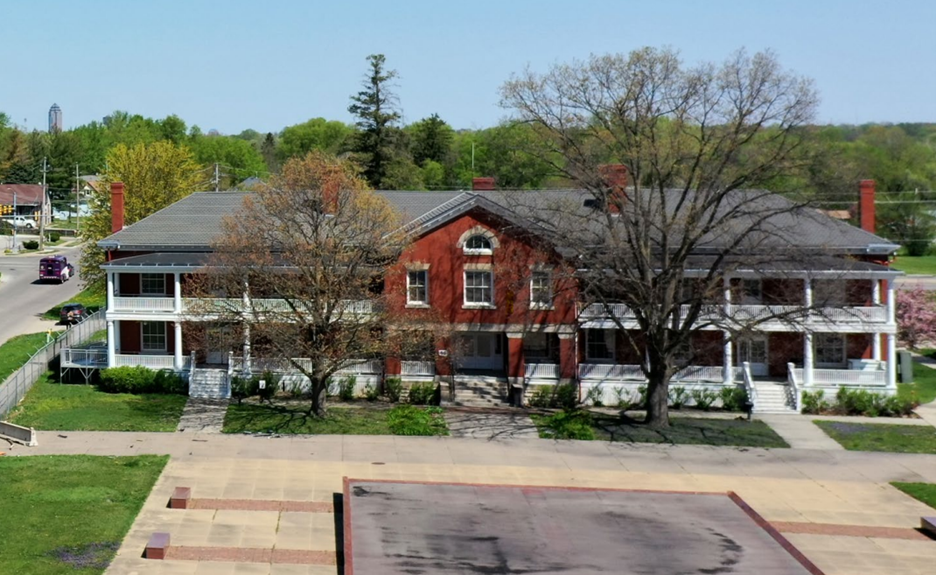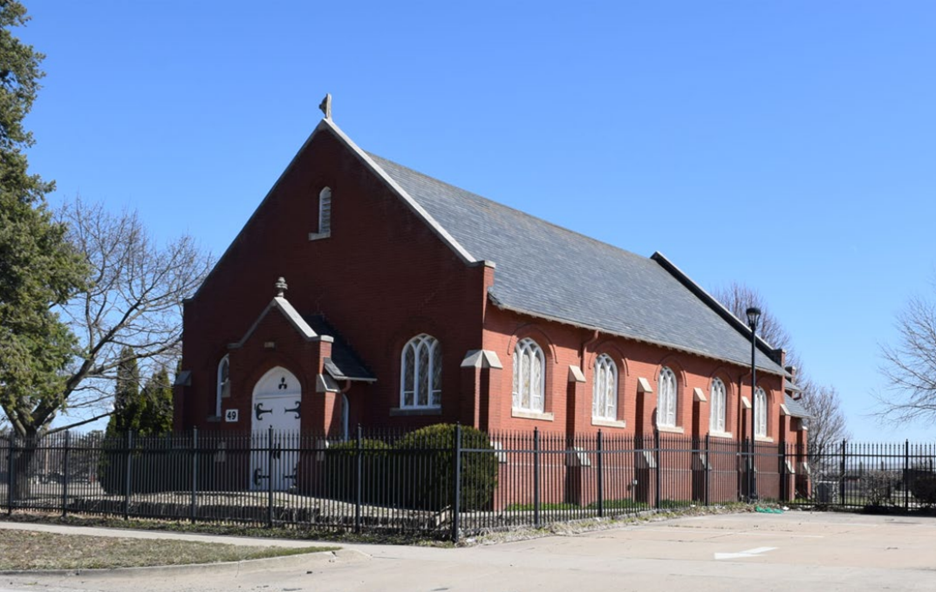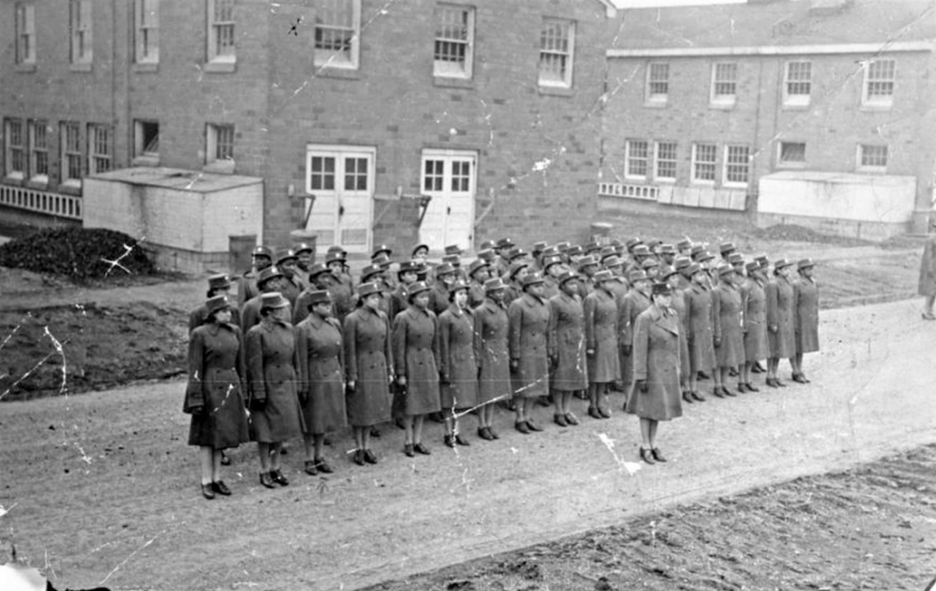Fort Des Moines trained Black and female soldiers. Now, it could become a local landmark
A training camp for Black officers during World War I and the Women's Army Corps during World War II could soon become a local landmark.
The 120-year-old Clayton Hall and Chapel, located on a 3.3-acre site on the southeast corner of East Army Post and Chaffee roads, are the oldest surviving structures of the Fort Des Moines No. 3 army base. The museum and chapel have had many lives since constructed in 1903 and 1910, respectively, serving as housing for soldiers, a hospital, and a training center for Black officers and women.
Today, Clayton Hall houses the Fort Des Moines Museum, which preserves and commemorates the leadership of the people who trained there, according to its website. The chapel is used for weddings and other services.

Historic preservation consultant Kelli Lydon, who researched the site, said she was surprised to find few people in Des Moines know about the building's national importance to racial progress and women's access to leadership.
Because of more severe racial tensions in other parts of the country, Des Moines was chosen to host Black soldiers thanks to Iowa's "hospitable" nature during World War I, she said.
"I don't think we here in Iowa recognize that we're often in the forefront of these kinds of battles," Lydon said. "The idea was that Iowa was on showcase — Des Moines especially. It was a way for Des Moines to kind of be a host to all of these people from around the country. There's a lot of people who may be still alive from the World War II era who maybe remember (Women’s Auxiliary Army Corps members) walking up and down the Des Moines streets in uniform."
More:What stories should be preserved in Des Moines history? The city wants to know
The city's Landmark Review Board nominated the site in April to become a local landmark to be known as Fort Des Moines Memorial Park. The Plan and Zoning Commission approved the proposal Thursday and the Des Moines City Council will soon vote on its designation.
The army training school is already registered as a National Historic Landmark and both the hall and chapel went through significant restorations in the 1990s and early 2000s, respectively. But Lydon said local landmark status would allow for tax credits to help fund maintenance work such as elevator and water damage repairs and HVAC improvements. It also means any alterations or demolition would be subject to Landmark Review Board review and require City Council approval.
Housing, hospital and training hub for Black officers, women: The many lives of Clayton Hall

Clayton Hall is a two-story neo-classical building most likely named after former Arkansas Gov. Powell Foulk Clayton, who fought for the Union in the Civil War. It once housed 12 high-ranking, unmarried officers and was later remodeled to house families of married officers, according to the Plan and Zoning staff report.
Lydon said it was known for the quality of its dining halls, with elaborate dinners and dancing. "So you can imagine that they were kind of the social place to be on the base," she said.
The chapel was constructed to serve the religious needs of the fort.

When the U.S. entered World War I in 1917, Fort Des Moines No. 3 was the only camp of 17 across the nation to serve as an officer's training camp for Black soldiers and medical personnel, according to the staff report. Nearly 640 Black officers received a commission at the end of their training. Many served in combat operations in France. Some earned the Distinguished Service Cross from the United States and honors from the French government.
The fort later became U.S. General Hospital No. 26 to treat war injuries and help rehabilitate soldiers, Lydon said. More than 500 soldiers treated at the hospital were amputee survivors of European battlefields.
More:Historic Fort Des Moines renovation brings much-needed affordable housing to metro
During World War II, the site became the first Women's Auxiliary Army Corps where more than 70,000 women were trained, including 40 Black women in the initial officer class, the staff report said.
"It was a real opportunity for women to step up in leadership, get some training, get more education and have some opportunities open up for them in careers that might not have otherwise been available to them," Lydon said.

The "auxiliary" status was dropped in 1943 making it the Women's Army Corps — a change to signify women were granted all the rank and privileges of their male counterparts.
Lydon said both the hall and the chapel are one of the few parts of the original Fort Des Moines that are still functioning as something related to its history. Four-century-old Army barracks and two horse stables at Fort Des Moines were converted into affordable housing units.
"This is the place you can go to actually experience what the fort used to be like," she said. "So I really think that the city values it and I think they want to promote it more. The fact that it's a museum and open to the public is also kind of a winning point for us that it's something for everybody to experience."
More: Field of Dreams house, a former jail and a llama farmhouse among Iowa's unique vacation rentals
Des Moines local landmarks
Sites are listed in order by their inclusion as a local landmark. This information is from the city of Des Moines.
The Lexington Apartments, 1721 Pleasant St.
The Gold Star Monument — Lutheran Hospital Grounds, 700 E. University Ave.
Woodland Cemetery, 2019 Woodland Ave.
Drake University Municipal Observatory, 4898 Observatory Road
Southeast Water Trough, 1000 Scott Ave.
Colonial Bread Sign, 1225 Second Ave.
Butler Mansion, 233 Fleur Drive
Glendale Mausoleum, 1550 48th St.
Clare and Miles Mills Rose Garden at Greenwood Park, 4500 Grand Ave.
Sylvan Theater at Greenwood Park, 4500 Grand Ave.
Wallace House, 756 16th St.
American Federal Building, 601 Grand Ave.
Charles Martin House, 3939 Grand Ave.
Hoyt Sherman Place, 1501 Woodland Ave.
Oakwood Estate/James S. Carpenter House, 3320 Kinsey Ave.
Esther Hall, 921 Pleasant St.
Norden Hall, 709 E. Locust St.
Boyd Cottage, 304 42nd St.
Masonic Temple, 1011 Locust St.
Des Moines Public Library, 100 Locust St.
Stockdale Double House, 4018-20 Ingersoll Ave.
The Trolley Loop, 49th Street and University Avenue
Walker Playground Shelter at Columbus Park, 1921 SE First St.
Varsity Theater, 1207 25th St.
Drake Park Playground Shelter, 2300 Drake Park Ave.
Financial Center, 666 Walnut St.
Snookies Malt Shop neon sign, 1810 Beaver Ave.
Crescent Chevrolet sign, 555 17th St.
Virginia Barreda is the Des Moines city government reporter for the Register. She can be reached at vbarreda@dmreg.com. Follow her on Twitter at @vbarreda2.
This article originally appeared on Des Moines Register: Fort Des Moines army base could be preserved as a memorial park

